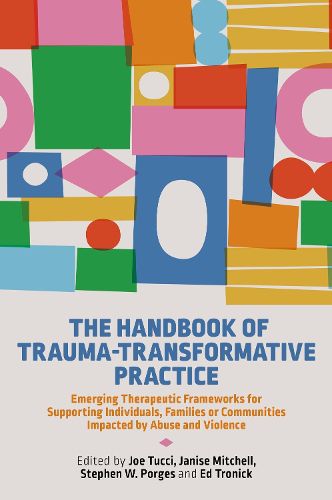Readings Newsletter
Become a Readings Member to make your shopping experience even easier.
Sign in or sign up for free!
You’re not far away from qualifying for FREE standard shipping within Australia
You’ve qualified for FREE standard shipping within Australia
The cart is loading…






The definitive Handbook of Trauma-Transformative Practice brings together the work of leading international trauma experts to provide a detailed overview of trauma-informed practice and intervention: its history, the latest frameworks for practice and an inspiring vision for future trauma-transformative practice.
The Handbook is interdisciplinary, incorporating trauma research, interpersonal neuroscience, the historical and continuing experiences of victims and survivors, and insights from practitioners. It addresses a range of current issues spanning polyvagal theory, the social brain, oxytocin and the healing power of love, and the neuropsychological roots of shame. It also considers trauma through the lens of communities, with chapters on healing inter/transgenerational trauma and building communities' capacity to end interpersonal violence.
Furthermore the Handbook makes the case for a new way of thinking about trauma - trauma transformative practice. One which is founded on the principle of working with the whole person and as part of a network of relationships, rather than focusing on symptoms to improve practice, healing and recovery.
$9.00 standard shipping within Australia
FREE standard shipping within Australia for orders over $100.00
Express & International shipping calculated at checkout
The definitive Handbook of Trauma-Transformative Practice brings together the work of leading international trauma experts to provide a detailed overview of trauma-informed practice and intervention: its history, the latest frameworks for practice and an inspiring vision for future trauma-transformative practice.
The Handbook is interdisciplinary, incorporating trauma research, interpersonal neuroscience, the historical and continuing experiences of victims and survivors, and insights from practitioners. It addresses a range of current issues spanning polyvagal theory, the social brain, oxytocin and the healing power of love, and the neuropsychological roots of shame. It also considers trauma through the lens of communities, with chapters on healing inter/transgenerational trauma and building communities' capacity to end interpersonal violence.
Furthermore the Handbook makes the case for a new way of thinking about trauma - trauma transformative practice. One which is founded on the principle of working with the whole person and as part of a network of relationships, rather than focusing on symptoms to improve practice, healing and recovery.